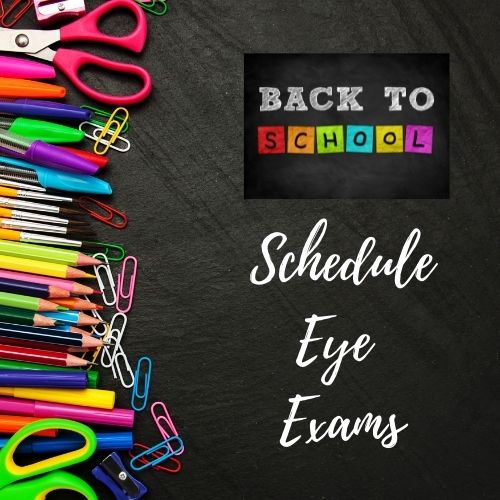Why Back-to-School Eye Exams are Essential


Back to school eye exams can detect vision problems which may lead to poor academic performance. Poor vision can cause vision-related learning problems.
School aged children need annual eye exams. “Back to school” serves as a good yearly reminder to have your child get a thorough eye exam.
Undetected vision problems hinder education and can cause a child to disengage from the learning process. Many academic difficulties are linked to vision problems, so make sure your back-to-school list includes a comprehensive eye exam for your child.
Schools do provide vision screenings. However, these screenings are only simple visual acuity tests and while they are an important evaluation, they do not include eye health as part of the screening or accurately identify the type of refractive error or eye condition that has caused the child to fail the visual acuity test. That can only be assessed by an eye care professional during a comprehensive eye exam.
Back to School Eye Screenings
School screenings pass almost 75% of children with vision problems and of the children who do fail the eye screening, almost 40% do not receive follow-up care with an eye care professional.
A child with nearsightedness, farsightedness, or an astigmatism can struggle with poor performance in academics and athletics because of his or her lack of visual acuity. This is a struggle that could be eliminated with a properly diagnosed refractive error and corrective glasses or contact lenses.
Some children have convergence insufficiency which means the eyes have trouble working together. Vision therapy consisting of eye exercises can help overcome this issue, but some children will require special prism glasses or surgery.
About 80% of what a child learns is from information that has been presented visually, so good vision is essential to learning.
Learning Related Vision Problems
The symptoms of learning-related vision problems include:
- Headaches or eye strain
- Blurred vision or double vision
- Crossed eyes or eyes that appear to move independently of each other (Read more about strabismus.)
- Dislike or avoidance of reading and close work
- Short attention span during visual tasks
- Turning or tilting the head to use one eye only, or closing or covering one eye
- Placing the head very close to the book or desk when reading or writing
- Excessive blinking or rubbing the eyes
- Losing place while reading, or using a finger as a guide
- Slow reading speed or poor reading comprehension
- Difficulty remembering what was read
- Omitting or repeating words, or confusing similar words
- Persistent reversal of words or letters (after second grade)
- Difficulty remembering, identifying or reproducing shapes
- Poor eye-hand coordination
Ophthalmologists are highly trained professionals who can accurately diagnose, treat, and manage eye disorders. Giving your child the opportunity to have a comprehensive eye exam will ensure your child has the visual acuity and ocular health to perform well both academically and athletically.
If you would like to make an appointment, call us 609.877.2800 or EMail us.
Gregory Scimeca, M.D.
Ophthalmologist and Medical Director
The Eye Professionals
Our Locations
